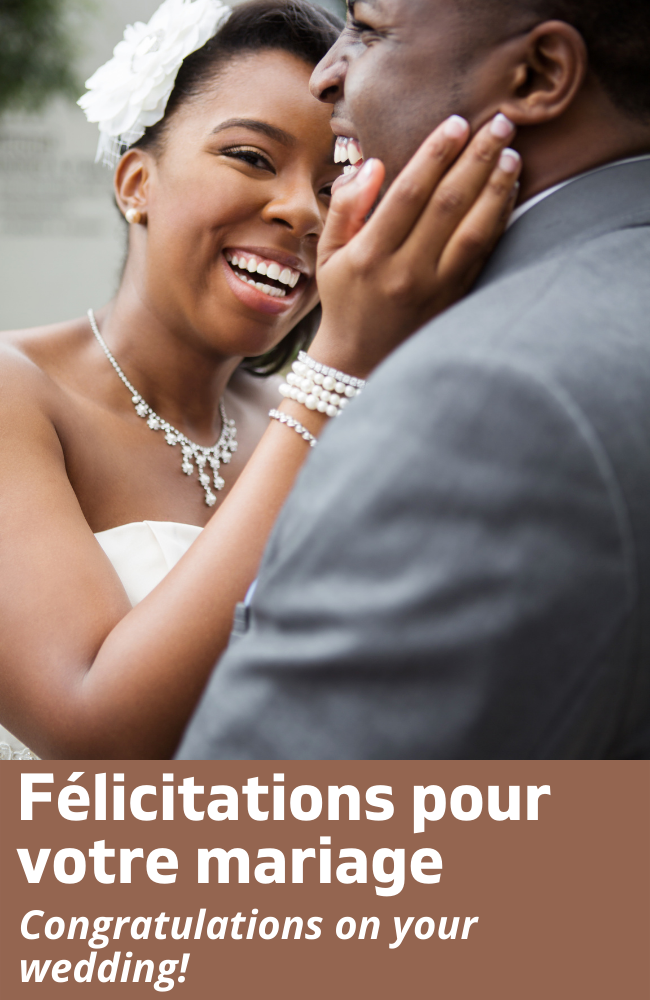How do you say “Congratulations!” in French?
The most common way to say congratulations In French in “félicitations” (pronounced felisitasjɔ̃). In this post we’ll discover other ways say “congrats” in French and which words to use in specific situations such as life events such as graduations, marriages and having children.

How to pronounce félicitations
Before we go any further, let’s have a close look at the pronunciation of “félicitations“. When said correctly, it sounds like “fay-lee-see-tah-see-ɔ̃”. The “ɔ̃” is the nasal -on sound found in the word “bonjour“.
This page on Forvo offers two audio samples of félicitations. My friend, Vincent, a star French teacher on YouTube, teaches how to pronounce félicitations in the following video:
9 Ways to congratulate people in French
In the following section we’ll look at different ways to say “congratulations” in French.
It’s worth clarifying that while “felicitations” does exist as an English word. It’s slightly outdated in English and has a slightly different meaning. According to the Oxford dictionary, felicitations in English means “words expressing praise for an achievement or good wishes on a special occasion”.
1) Félicitations !
In French, the interjection for “congrats!” or “congratulations!” simply say, “félicitations !”. Here are some example sentences:
- Félicitations ! Je suis très content pour vous ! Congratulations! I’m very happy for you!
- Vous avez vraiment réussi ! félicitations ! You really succeeded! Congratulations!

2) Félicitations pour _!
The construction “félicitations pour + noun” is used to indicated “congratulations on + noun”. Here are some examples:
- Félicitations pour le bébé! Congratulations on the baby!
- Félicitations pour ton nouveau poste ! Congratulations on your new job position!
3) Félicitations pour avoir + past participle
To express, congratulations on doing something (in the past tense), use “félicitations pour avoir + past participle”. Here are some examples:
- Félicitations pour avoir gagné à la loterie ! Congratulations for having won the lottery!
- Félicitations pour avoir réussi l’examen ! Congratulations for having passed the exam!
4) Je te/vous féliciter
The verb, “féliciter“ means to congratulate. Thus, “Je te/vous félicite” means “I congratulate you”. You use the “te” for people you know and “vous” for formal situations. Here are some examples:
- Je te félicite pour ta réussite. I congratulate you on your success (or congratulations on your success).
- Je vous félicite pour votre mariage. I congratulate you for your marriage (or congratulation on your marriage).
5) Bravo !
Another way to say congratulation is the expression, “Bravo !”, which is a borrow in English and French from Italian. “Bravo” can translate to congratulations, kudos and well done . Here’s an example:
- Tu as bien chanté. Bravo ! You sang well. Congratulations!
“Bravo” can also be followed by pour + noun to mean “congratulations on”. For example:
- Bravo pour ton nouveau poste de travail. Congratulations on your new job position.

6) Chapeau !
The word “chapeau” means hat in French. However, “chapeau” is a slang of informal term for congratulations, hats off or well done. This way of saying congratulations comes from the expression, “tirer son chapeau à quelqu’un”, which translates literally to “to take your hat off to somebody”. Please note that this expressions is a bit old-fashioned. For example!
- Vous avez vraiment bien chanté. Chapeau ! You sang so well! Congratulations!
- Tu as eu le bac. Chapeau ! You passed the baccalaureate exam. Congratulations!
7) Bien joué !
The expression “Bien joué !” translates literally to “well played” but really means “well done!”. It can also be used sarcastically if somebody were to break a dish or a glass, so simply do something stupid. Here’s an example:
- T’as encore cassé une assiette ? Bien joué ! You broke a plate again? Well done!
8) Tous mes vœux de bonheur
The expression, “tous mes vœux de bonheur” translates literally to “all my wishes of happiness” and can be use to express congratulations. For example:
- Tous mes vœux de bonheur pour votre mariage. Best wishes for your marriage!
9) Tous mes/nos compliments
The expression, “tous mes/nos compliments” is a formal way of saying congratulations and translates literally to “all my/our compliments”. It can also be followed by pour (for). Here’s an example:
- Tous nos compliments pour votre mariage. Congratulations for your marriage.


